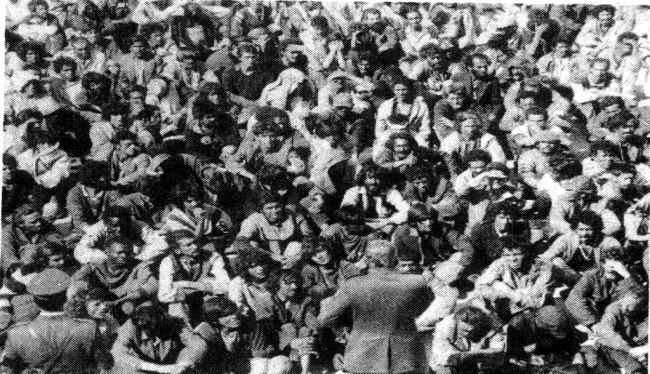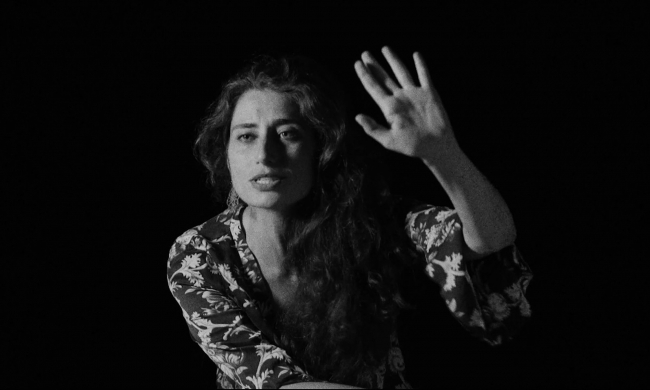Descripción de la Exposición
Corpo Fechado—The Devil’s Work is a filmic poem that interprets the story of José Francisco Pereira, a slave who was tried by the Lisbon Inquisition for sorcery and sodomy. An adaptation of Pereira’s trial is interwoven with passages from Saint Peter Damian’s passionate 11th century condemnation of sodomy as an unrepentable sin in “Letter 31” (also known as “The Book of Gomorrah”), and Walter Benjamin’s iconic elucidations on historicism and progress in “Theses on the Philosophy of History.” The film revisits the morally and legally charged figure of the sodomite as a violent historical construction and expression of ecclesiastical, institutional, and colonial patriarchy.
In 1731 José Francisco Pereira, a slave from Judá, Costa da Mina, was tried by the Lisbon Inquisition for sorcery. Pereira confessed that together with fellow slave José Francisco Pedroso, he made and distributed bolsas de mandinga, amulets to protect slaves from wounds both in Brazil and Portugal. He also confessed to have made pacts with male demons and engaged in copulation with them. Pereira was thus also charged with sodomy, exiled in the galleys as a slave rower, and forbidden to enter Lisbon forever.
In 1049 Italian monk Saint Peter Damian composed “Letter 31” to Pope Leo IX condemning sodomy and all acts against nature committed to satisfy sexual pleasure beyond procreation—ike masturbation, interfemoral fornication and anal coitus—as unrepentable sins. The Saint passionately implored the Pope to eradicate this widespread sin within the clergy through legal and theological arguments, eventually describing the spiritual condition of the damned Sodomitic soul. “Letter 31” arguably established the subsequent historical position of the Catholic Church against homoerotic sexual practices by categorizing them and placing them at the bottom of the moral and legal orders.
In “Theses on the Philosophy of History” (1940), Walter Benjamin critiques historicism and the notion of the past as a continuum of progress. He introduces this critique with the metaphor of the ‘angel of history,’ a figure whose face is turned towards the past, with its wings caught up in a storm, unable to look into the future. In the essay Benjamin explains the framework of modernity pointing out how society has constructed “progress,” an illusion in which old systems endure and are propelled forward by a promise of a better future.
Corpo Fechado—The Devil’s Work works as a palimpsest. These three chronologically distinct accounts are layered to contest the violence exerted by the colonial Catholic Church to promote a singular theological model and the creation of forms and languages of sexual oppression and the subjectivities they perpetuate.
Commissioned by EGEAC/Galerias Municipais, Lisbon for the exhibition “Carlos Motta: Corpo Fechado” at Galeria Avenida da Índia, October 2018 — February 2019. Curated by Pedro Faro and Sara Antónia Matos.
CREDITS
A film by
Carlos Motta
Written by
Carlos Motta
With texts by
Walter Benjamin from “Theses on the Philosophy of History” (1940)
Saint Peter Damian from “Letter 31: The Book of Gomorrah” (circa AD 1049)
With
Dario Azzellini as Saint Peter Damian’s voice
Paulo Pascoal as José Francisco Pereira
John Arthur Peetz as The Monk
Vicente Wallenstein The Conquistador
Director of Photography
Mario Melo Costa
Additional Camera
Carlos Motta
Video Editing
Carlos Motta
Video Editing Consultant
Irit Batsry
Music and Sound Design
Ian Turner
Co-Produced
EGEAC/Galerias Municipais (Lisbon)
Galeria Vermelho (São Paulo)
Mor Charpentier Galerie (Paris)
P.P.O.W Gallery (New York)
Production
Anze Persin, Stenar Projects, Lisbon
João G. Rapazote, EGEAC/Galerias Municipais, Lisbon
Post-Production and Color Correction
Aleksander Bergan
Camera Assistant
Danilo Bernades de Souza
Gaffer
Zé Manuel
Sound Recording
Bernardo Theriaga
Ian Turner
Production Assistants
Camilo Godoy
Ines Lima, Stenar Projects, Lisbon
Transcriptions and Translations
Luísa Yokochi and Ana Yokochi, KennisTranslations, Lisbon
Rafael Martins
Research Assistants
João Gaspar, EGEAC/Galerias Municipais
Julio Rodriguez
Artworks in order of appearance
Nautical Chart “North and South Atlantic,” Museu de Marinha, Lisbon
“Exú,” religious fetish sculpture purchased at a store in São Paulo, 2018
“Ship Santa Cruz,” Anonymous, 17th Century, Museu de Marinha, Lisbon
Planisfério “Mapa-mundo,” Alberto Cutileiro, 1970, Museu de Marinha, Lisbon
Chessboard, Alberto Cutileiro, 1989, Colecções Philae, Museu de Marinha, Lisbon
“Process 11.774 of José Francisco Pedroso,” Lisbon Inquisition, Arquivo Nacional da Torre do Tombo, Lisbon
Locations in order of appearance
Santuário de Nossa Senhora do Cabo Espichel, Sesimbra
Museu de Marinha, Lisbon
Arquivo Nacional da Torre do Tombo, Lisbon
Museu Nacional de Arqueologia, Lisbon
Cabo Espichel, Sesimbra
Equipment Rental
Videocine, Lisbon
Studio
Digital Azul, Lisbon
Institutional Acknowledgements
Arquivo Nacional Torre do Tombo/Direção-Geral do Livro, dos Arquivos e das Bibliotecas:
Dr. Silvestre Lacerda, Dr. José Maria Furtado, and Dr.ª Anabela Ribeiro
Centro Paroquial de Bem-Estar Social do Castelo de Sesimbra: Padre Eduardo and André Brazinha
Museu de Marinha
Museu Nacional de Arqueologia/Direção-Geral do Património Cultural: Dr. António Carvalho
Performance Studies, New York University: Malik Gaines
Very Special Thanks
Alex Mor
Ana Maria Tavares
Anze Persin
Bernardo Mosqueira
Eduardo Brandão
Filomena Soares
Jack McGrath
João G. Rapazote
John Arthur Peetz
Juan Eyheremendy
Mafalda Franco
Manuel Santos
Pedro Faro
Penny Pilkington
Philippe Charpentier
Sara Antónia Matos
Trey Hollis
Wendy Olsoff
Special Thanks
Alp Klanten
Cristina Motta
Irit Batsry
João Gaspar
Linn Tonstad
Malik Gaines
Welket Bungué
Thanks
CAB A.D. Sousa Monteiro
CAB M. Pereira da Fontoura
Isaac Julien Studio
Mark Nash
SAJ A. Costa Alves
Zeb Tortorici

Actualidad, 09 nov de 2018
Por PAULA ALONSO POZA
El Museo de Arte Moderno La Tertulia de Cali, Museos Banco de la República o la Universidad Nacional de Colombia son algunos de los espacios que presentan muestras destacadas. Hay ...

Actualidad, 31 oct de 2018
#loquehayquever en Portugal: una programación llena de nombres internacionales
Por PAULA ALONSO POZA
Hasta siete retrospectivas de grandes artistas nacionales e internacionales se han inaugurado en Portugal en las últimas semanas. Hay creadores lusos, colombianos, estadounidenses, franceses y venezolanos.

Premio. 13 mar de 2025 - 27 abr de 2025 / Madrid, España
Componer Saberes para imaginar y construir futuros sostenibles

Exposición. 03 abr de 2025 - 07 sep de 2025 / Museo Guggenheim Bilbao / Bilbao, Vizcaya, España

Formación. 01 oct de 2024 - 04 abr de 2025 / PHotoEspaña / Madrid, España